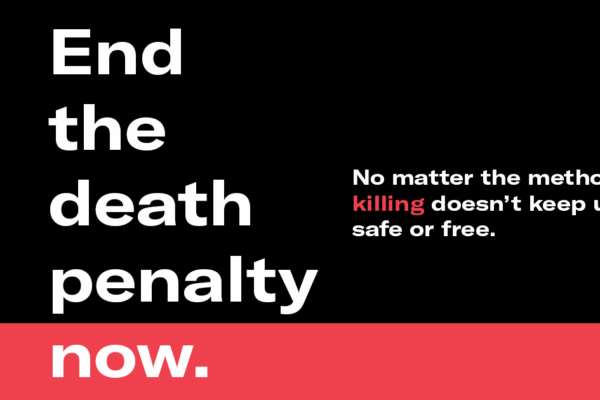On July 31, the South Carolina Supreme Court ruled to allow the state to execute incarcerated people by electrocution, firing squad, or lethal injection. The ACLU of South Carolina opposes the death penalty and urges state lawmakers to abolish the practice regardless of method.
“The death penalty has no place in our society or under our Constitution,” said ACLU-SC Executive Director Jace Woodrum. “Execution is a costly, ineffective form of cruel and unusual punishment that not only fails to make us safer but raises the possibility of the state killing innocent people in our name. In addition, South Carolina’s ‘shield law’ adds a layer of secrecy about the methodology of killing, making future executions less transparent than ever before.”
As part of an effort to build public understanding of the death penalty system and its harmful effects, the ACLU of South Carolina is currently suing the S.C. Department of Corrections over its uniquely draconian ban on news media interviews with incarcerated people.
We seek to publish an interview with Marion Bowman Jr., who resides on South Carolina’s death row in Columbia. As Mr. Bowman prepares to petition the governor to commute his sentence to life imprisonment, we want to share Mr. Bowman’s story in his own words. For more information about this ongoing lawsuit, see our case page for ACLU-SC v. Stirling.
The following are some basic facts about the modern death penalty:
- The death penalty doesn't make us safer. Between 2010 and 2018 the murder rate was 20% lower in non-death penalty states compared to death penalty states. Source: Death Penalty Information Center
- The death penalty system is racist in practice. Black people make up more than half of the residents of South Carolina’s death row despite comprising only 26% of the state’s population. Nationwide, we know that a Black male is 18 times more likely to receive a death sentence if the victim was white versus Black. Source: “Forty Years of Death: The Past, Present, and Future of the Death Penalty in South Carolina (Still Arbitrary After All These Years)” by John H. Blume and Lindsey S. Vann, 2016 (PDF download)
- The death penalty is costly. Studies consistently find that the death penalty system costs taxpayers at least 2 to 3 times more than a sentence of life without parole. One study in North Carolina found that repealing the death penalty could have saved the state almost $22 million over the course of just two years. Source: “Potential Savings from Abolition of the Death Penalty in North Carolina” by Philip J. Cook, 2009 (PDF download)
- Courts make mistakes. South Carolina's courts have convicted and sent at least 2 people to death row who were later acquitted. When new evidence arises, there is no opportunity for justice if we have already killed someone. This is one of the ways that the death penalty precludes justice rather than advancing it. Source: Death Penalty Information Center
Here are some more resources for understanding the death penalty:
The case against the death penalty (ACLU)
The Death Penalty: Questions and Answers (ACLU)
Wasteful & Inefficient: The alarming cost of the death penalty (Equal Justice USA)
Stay Informed
Sign up to be the first to hear about how to take action.
By completing this form, I agree to receive occasional emails per the terms of the ACLU’s privacy statement.
By completing this form, I agree to receive occasional emails per the terms of the ACLU’s privacy statement.

